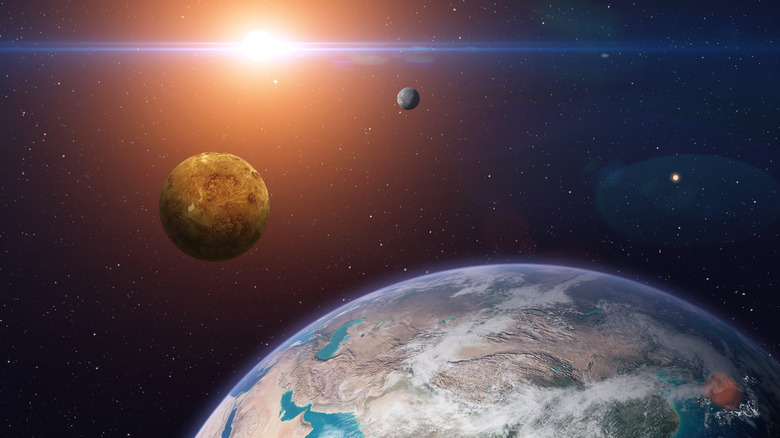The Complicated Story Behind How Earth Got Its Name
Our home, planet Earth, is a wonderful place with a complicated, rich history. This can result in a lot of traditions being lost along the way, including various names of the world itself. While we don't know exactly who first coined the word "Earth" and assigned it to our planet, historians have been able to use linguistics to study the origin of the term (via Live Science).
According to World Atlas, our modern spelling of the word earth is estimated to have been around for at least 1,000 years. But this is not the original spelling. Earth as a word originates from the Indo-European base er. In German, this became the word ertho, and in Old English became the word eorthe (via Cal Tech's Cool Cosmos website). According to Science Focus, this later became the modern German and English words erde and earth. Other terms used to describe our planet came to be in a similar fashion.
Latin was used as a base for several other terms used to describe Earth
While the word earth may have come from English and Germanic sources, the other words we use to describe planet Earth come primarily from Latin. For example, the Latin word terra means land, and is used as a base in English words such as terrestrial and subterranean (via Live Science). Terms like the word orbit, used to describe the path that Earth and the other planets take around the sun, also come from Latin. In Latin, orbita means course and track (via Vocabulary).
Unlike the other planets, there are no words to describe planet Earth that come from Greek or Roman mythology, according to World Atlas. This makes Earth stand out from the rest of the solar system in a unique way. Even our solar system's dwarf planets are named after mythological beings, such as Makemake, a dwarf planet orbiting out past Neptune that is named after the Rapanui god of fertility, per NASA.
Other planet names originate in mythology
The fact that Earth's name does not come from mythology puts us in a unique place in our solar system, as all the other planets' names come from a Greek and Roman mythology. Mercury, Venus, Mars, Jupiter, Saturn are all visible in the night sky and thus were visible to early astronomers. Even though they look like stars without the use of a telescope, these five planets could be seen moving in a different way than the rest of the night sky. According to History, the Romans named the planets after their gods and goddesses, based on characteristics that could be made out from Earth, such as Mars' red color and Venus' brightness.
Uranus and Neptune were not discovered until much later, and only with the use of telescopes. Despite this, astronomers decided to keep up with naming them after mythological gods. For example, Uranus was named by German astronomer Johann Elert Bode after the Greek god of the sky (via Space.com). Meanwhile, according to NASA, Neptune was named after the Roman god of the sea, for its deep blue color.


